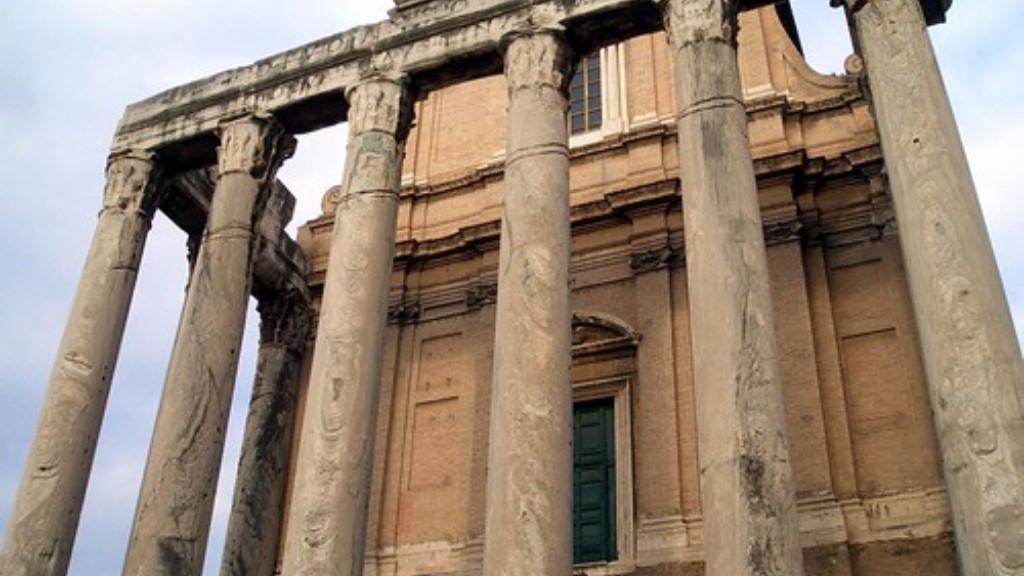The religion of Christianity is one of the most widely practiced religions in the world, with over 1.2 billion followers worldwide. The religion has its roots in the teachings of Jesus Christ, who lived in the Roman province of Judea during the first century AD. Christianity quickly spread throughout the Roman Empire, and became the official religion of the empire under the Emperor Constantine in the fourth century. Though Christianity is no longer the official religion of Rome, it remains one of the city’s most practiced religions.
The early Christians in Rome were viewed as a Jewish sect by the Roman authorities. This changed after the Great Fire of Rome in 64 AD when Emperor Nero blamed the Christians for the fire. This led to the first persecution of Christians in Rome.
Was Christianity popular in ancient Rome?
Christianity continued to spread through the territories of the western Roman Empire after its fall in 476 Over the next several centuries, it became the dominant religion in the city of Rome as well as the European regions over which the Roman Empire had ruled. This was due to a number of factors, such as the work of missionaries, the establishment of churches and monasteries, and the support of rulers and other powerful people.
Christianity was appealing to many members of the lower classes in the Roman empire not only because of its promised liberation from any afflictions encountered in this world but also because of the established community that was totally equal, regardless of social class or gender, through baptismal promise.
How did Christianity impact Rome
The Roman state approved of Christianity which directly undermined its religious traditions. The belief in one god weakened the authority and credibility of the emperor.
Rome had the most problems with monotheistic religions, such as Judaism and Christianity, because these religions believe in only one god. This meant that followers of these religions were not allowed to worship any other gods, which was a problem for Rome, which had many different gods that were worshipped.
How did Romans react to Christianity?
Christians were occasionally persecuted during the first two centuries CE, but the Roman state’s official position was generally to ignore them unless they clearly challenged imperial authority.
The rise of Christianity did play a small, but not insignificant, part in the decline of the Roman Empire. Christianity eroded traditional Roman beliefs and values and caused conflicts between Christians and those who continued to hold onto the old pagan philosophies. Christianity also contributed to the decline of the Roman Empire by weakening the Roman state religion and causing division within the empire.
Was Christianity illegal in Roman Empire?
The Edict of Milan was a proclamation that granted religious tolerance to Christians within the Roman Empire. Prior to this, Christians had been persecuted for their beliefs. The edict allowed them to practice their religion without fear of retribution. This ultimately led to Christianity becoming the official religion of the empire under Constantine.
The Diocletianic or Great Persecution was the last and most severe persecution of Christians in the Roman Empire. In 303, the emperors Diocletian, Maximian, Galerius, and Constantius issued a series of edicts rescinding Christians’ legal rights and demanding that they comply with traditional religious practices. The persecution lasted until 311, when Galerius, the last emperor to participate in the persecution, issued an edict of toleration.
How many Christians were killed in Rome
It is estimated that by 200 AD, the Christian faith had spread to most regions of the Roman Empire. However, Christians were mostly concentrated in the larger urban areas, such as Gaul, Lyons, Carthage, and Rome. By 325 AD, the number of Christians had grown to an estimated 7 million. But as the faith grew, so did persecution. It is estimated that as many as 2 million Christians were killed for their beliefs.
In today’s society, there is a lot of discussion about which laws we should obey and which ones we should disobey. However, Jesus’ teaching is clear: we should obey both the laws of God and the laws of the government. This can be difficult, but it is important to remember that we are called to be obedient to both.
Who wanted to destroy the Bible?
The Roman Emperor Diocletian was one of the most brutal persecutors of Christians in history. In AD 301-304, he burned thousands of copies of the Bible, commanded that all Bibles be destroyed, and decreed that any home with a Bible in it should be burned. He even built a monument over what he thought was the last surviving Bible. Diocletian’s persecution of Christians was so severe that it was known as the “Great Persecution.”
The Roman World based their religion off gods and goddesses while Christianity was based off of Jesus and his crucifixion on the cross for our sins. Both of these religions share different but in some ways similar purposes. The main purpose for both religions is to have a set of beliefs and moral values to guide people on how to live. Both religions also share the idea of virtue, or behaving in ways that are morally good. Christians believe that God wants people to follow Jesus and live according to his teachings. Romans believed that their gods and goddesses wanted people to live virtuously. Lastly, both religions have the idea of destiny, or what happens after death. Christians believe in heaven and hell, and that people will be judged based on their actions on Earth. The Romans believed that people went to differentAfterlife based on their deeds while alive.
What religion were the Romans at the time of Jesus
The Roman Empire was a primarily polytheistic civilization, which meant that people recognized and worshiped multiple gods and goddesses. Despite the presence of monotheistic religions within the empire, such as Judaism and early Christianity, Romans honored multiple deities. The pantheon of Roman gods included Jupiter, Juno, Minerva, and Apollo, among others. Worship of these gods and goddesses was often conducted at temples, which were built to honor specific deities. Roman polytheism was also evident in the practice of ancestor worship, which was a way to honor one’s deceased relatives.
In Annals of Imperial Rome, Tacitus connects Jesus to his execution by Pontius Pilate. He writes that Pilate sentenced Jesus to be crucified because the Jews accused him of Rebellion, which was justified because Jesus had been encouraging the people to break the law and challenge the authorities. While on the cross, Jesus is said to have screamed out in a final prayer to God, asking why he had been forsaken.
Was Jesus alive during the Roman Empire?
Jesus likely died in Jerusalem around 30CE. It is thought that he was executed for crimes under Roman law, specifically in the province of Judea. Therefore, it is most likely that Jesus spent his entire life in the Roman Empire.
Why does God get angry? In the Bible, God gets angry at human violence, He gets angry at powerful leaders who oppress other humans, and the thing that makes God more angry than anything else in the Bible is Israel’s constant covenant betrayal.
How do we know the Bible is true
The Bible is one of the most, if not the most, important books in history. It has been copied and recopied countless times throughout the centuries, and yet the accuracy of its transmission is remarkable. Despite common skeptical claims that the Bible has often been changed through the centuries, the physical evidence tells another story. The New Testament records are incredibly accurate. So when we read the Bible today, we can be confident that we are reading an accurate account of God’s Word.
Exodus 15 tells the story of the parting of the Red Sea, which was a miraculous event that allowed the Israelites to escape from the pursuing Egyptian army. In this story, God becomes angry a second time at Pharaoh, who had previously caused God’s anger by oppressing Israel and refusing to listen to Him. This time, God’s anger is an act of judgment on Pharaoh and his armies, and He miraculously parts the sea to allow the Israelites to escape.
Warp Up
In ancient Rome, Christianity was viewed as a new and controversial religion. Many people were skeptical of it and its followers. Some saw it as a threat to the traditional Roman way of life. Others were fascinated by its teachings and attracted to its message of love and forgiveness.
In ancient Rome, Christianity was viewed as a strange and dangerous new religion. Its followers were often persecuted, and its beliefs were seen as a threat to the traditional Roman way of life. Over time, however, Christianity began to be more accepted, and by the 4th century it had become the official religion of the empire. Today, Christianity is still the largest religion in Rome, and its influence can be seen throughout the city.





